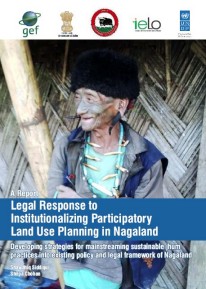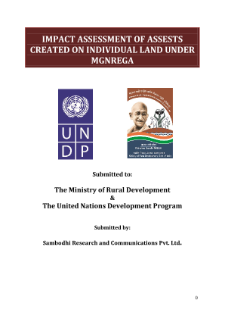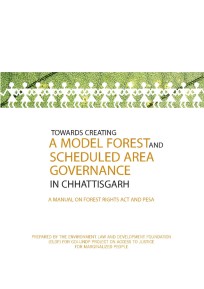
Topics and Regions
Land as a discipline in academics and in policy and development discourses, has remained comparatively under-developed. Land administration continues to be isolated and sectorally divided, over-bureaucratized and often-politicized. Contrary to the need, land governance portrays legal complexity and institutional inadequacy and exclusiveness. Contested landscapes of land governance in India calls for partnerships and innovations to make development more inclusive and prosperity shared. Participation of land-actors and users, especially communities, civil society and private sector are critical, to make land governance equitable and sustainable. Centre for Land Governance attempts to bridge information gaps, create evidence and build platforms for connection and conversations among land-stakeholders, through knowledge engagements around action and policy research, evidence-based advocacy, communication and capacity building
Details
Location
Contributions
Displaying 41 - 50 of 251Community Conserved Areas: Odisha and Madhya Pradesh- Directory
The Directory provides an overview of community-led conservation efforts in two states of India – Odisha and Madhya Pradesh. It captures the diverse and often innovative approaches adopted by communities to conserve ecosystems and species.
Review Paper: Status of Coastal and Marine Ecosystem Management in South Asia
The coastal sub-region of South Asia including Bangladesh, India, the Maldives, Pakistan and Sri Lanka harbours some of the world’s most significant coastal and marine ecosystems such as coral reefs, mangroves, seagrass meadows, river deltas and estuaries. They play a crucial role in reducing the effects of natural disasters. The paper reviews the status of coastal and marine ecosystem management in the region to enable adoption of an integrated approach to ecosystem management for effective risk reduction.
Conservation Across Landscapes: India’s Approaches to Biodiversity Governance
The publication examines five biodiversity governance models that have helped conserve India’s natural landscape. It presents salient features of these models and explores their effectiveness in conserving biodiversity, providing community access to resources and sharing of benefits and institutional design.
A Toolkit for Integrating Disaster Risk Reduction and Climate Change Adaptation into Ecosystem Management of Coastal and Marine Areas in South Asia
This toolkit provides a step-by-step guide to integrating disaster risk reduction and climate change adaptation into the coastal and marine ecosystem management in the coastal sub-region of South Asia including Bangladesh, India, Maldives, Pakistan and Sri Lanka.
Final Evaluation Report (Biodiversity Impact): Integrated Land and Ecosystem Management to Combat Land Degradation and Deforestation in Madhya Pradesh
The study assessed the biodiversity impact of the project supported by UNDP and the Government of Madhya Pradesh to support local communities in rehabilitating degraded forest, generating sustainable livelihoods and protecting the areas rich ecosystem. The project was supported by the Global Environment Facility.
Socio-Economic and Ecological Impact Study of Sustainable Land and Ecosystem Management in Shifting Cultivation Areas of Nagaland
A biodiversity project in Nagaland is improving the productivity and fertility of the jhum land and fallow areas. The increased productivity has spiked sales of products and the incremented farmer income substantially. The study also highlights how women in Nagaland have been empowered through the project.
Socio-Political and Environmental Dimensions of Vulnerability and Recovery in Coastal Odisha: Critical Lessons since the 1999 Super-Cyclone
The report aims to understand the nature of vulnerability and recovery of selected coastal communities in Odisha since super-cyclone of 1999. With intensive fieldwork in eight sites across coastal Odisha, the report takes a detailed look at livelihood trajectories, processes of housing reconstruction and access to community-based NGOs and state assistance.
Legal Response to Institutionalizing Participatory Land Use Planning in Nagaland
The report, prepared by the Indian Environment Law Offices, offers insights on mainstreaming Shifting Cultivation or Jhum through innovative interventions, such as Participatory Land Use Planning into policy, legal and institutional framework in Nagaland and help the state realize its full development potential.
Impact Assessment of Assets Created on Individual Land under MGNREGA
The study conducted in Andhra Pradesh, Chhattisgarh, Madhya Pradesh, Odisha, Rajasthan and Uttar Pradesh aims to evaluate the effects of creation of assets on lands of Small and Marginal Farmers, Scheduled Cast /Scheduled Tribe and Indira Awas Yojana Beneficiaries.
Towards Creating a Model Forest and Scheduled Area Governance in Chhattisgarh: A Manual on Forest Rights Act and PESA
This manual has been prepared under the auspices of the Government of India and UNDP project on "Access to Justice for Marginalized People." The simplified user manual aims to raise awareness of two crucial legislative acts which together expand the legal rights of some










